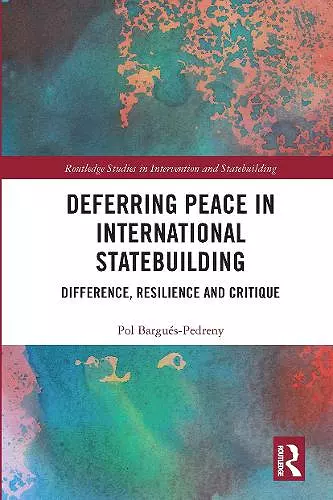Deferring Peace in International Statebuilding
Difference, Resilience and Critique
Format:Paperback
Publisher:Taylor & Francis Ltd
Published:30th Sep '20
Currently unavailable, and unfortunately no date known when it will be back
This paperback is available in another edition too:
- Hardback£145.00(9780815386278)

This book explores the last 25 years of international peacebuilding and recasts them as a growing crisis of confidence in universal ideas of peacebuilding and self-government.
Since current peacebuilding interventions are abandoning domineering, top-down and linear methodologies, and experimenting with context-sensitive, self-reflexive and locally driven strategies, the book makes two suggestions. The first is that international policymakers are embracing some of the critiques of liberal peace. For more than a decade, scholarly critiques have pointed out the need to focus on everyday dynamics and local initiatives and resistances to liberal peace in order to enable hybrid and long-term practice-based strategies of peacebuilding. Now, the distance between the policy discourse and critical frameworks has narrowed. The second suggestion is that in stepping away from liberal peace, a transvaluation of peacebuilding values is occurring. Critiques are beginning to accept and valorise that international interventions will continuously fail to produce sensitive results. The earlier frustrations with unexpected setbacks, errors or contingencies are ebbing away. Instead, critiques normalise the failure to promote stability and peace.
This book will be of much interest to students of peacebuilding, international intervention, conflict resolution, international organisations and security studies in general.
'This important book illuminates the spectre haunting projects of international peace and state-building: bad faith. The ease with which the critical Western gaze dismisses both domestic capacities for self-government and external projects of transformation is both closely examined and profoundly challenged. A must read for policy practitioners, academics and activists worried about the current stasis in international policy-making.'-- David Chandler, University of Westminster, UK
'This highly readable account of the evolution of understandings of peacebuilding is perhaps the first systematic attempt to focus on how universal liberalism is being questioned. Starting with developments in the 1990s and moving forward to arguments about the local, hybridity and resilience, the book skilfully charts the shifts in international discourse. Employing a philosophical critique, this is a much needed critical engagement with contemporary thinking.'--Jonathan Joseph, University of Sheffield, UK
'Pol Bargués Pedreny's forthcoming Deferring Peace in International Statebuilding offers a rigorous analysis of the rise and fall of liberal peace models since the 1990s, and international interventions seeking to re-engineer war-affected societies and establish peace. His insightful study of the evolving interventions in Bosnia and Kosovo, where considerable resources have been expended, illustrates the failures of international models and how policy-makers have adapted to their failures. The policy adaptations have retreated from liberal beliefs in democracy and self-government to non-liberal governance. Leading critiques of liberal peace models have been absorbed in ways suggesting the incapacity of both international actors and the war-affected societies to transform the situation. Policy ideas of local ownership and resilience do not mean the revival of self-determination, but the risk management of inse
ISBN: 9780367666705
Dimensions: unknown
Weight: 300g
162 pages